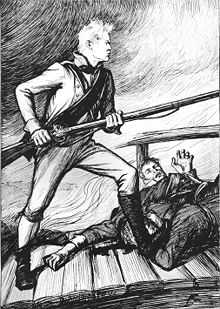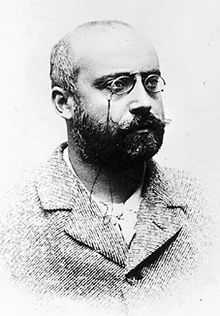Charles G. Widdén

Charles G. Widdén was a Swedish-born singer and comedian in the first quarter of the 20th century. He was based in New York City and performed primarily on the East Coast.[1]
Swedish-American entertainer
As a young child Charles G. Widdén came with his family to Worcester, Massachusetts. He is said to have been from the Swedish province of Närke. During the 1910s he became a very successful bondkomiker (rustic comic).
Bondkomik (rustic humor) was a popular form of entertainment in turn-of-the-century Sweden. It also had a large following among Swedish-Americans. The rustic comic, often clad as a country bumpkin, assumed an alias to go along with his outlandish appearance. Widdén, for instance, sometimes went by the name of Olle ve kvarna (Olle at the mill). Hjalmar Peterson was another bondkomiker from Sweden, who was active at the same time and had a similar repertoire. Peterson was better known by his stage name of Olle i Skratthult (Olle from Laughtersville).
Eventually Widdén moved to Brooklyn's large Swedish-Norwegian colony and became quite well known within the IOGT (International Order of Good Templars). Proximity to record companies in New York turned him into one of Swedish-America's leading recording artists. There is only one photograph of the man, and little is known about his personal life.[1]
Popular recording artist
Between 1913 and 1924 Charles G. Widdén recorded over 100 sides for the Columbia, Edison and Victor labels. His output was steady. His new releases came out every single year in this period. Widdén’s repertoire consisted of songs, poems, stories and monologues. Other than a few monologues in English he did everything in his native Swedish.[2]
The poetry included several works by the Swedish author Gustaf Fröding, whose lyrics and stories — popular on both sides of the Atlantic — were a staple of rustic humor. Widdén recorded Fröding’s poems concerning the supernatural: Bergslagstroll (Mountain trolls) and Skögsrån (The wood sprite) [3] as well as those dealing with immigration to America: Farväll (Farewell) and I bönhuset (At the prayer meeting).[2] J. L. Runeberg's poems of patriotic Finns were also represented: Soldatgossen (The soldier boy) and Sven Duva (a hero of the 1808-1809 war against Russia).[4] These verses were part of Runeberg’s epic work Fänrik Ståls Sägner (The Tales of Ensign Stål).
About one third of Widdén’s output was spoken word material, and much of his popularity rested on his original comic monologues. Today he is mainly remembered for the yodel-like laugh with which he punctuated these homespun tales. When speaking Swedish he sometimes assumed the comic persona of Olle ve kvarna (Olle at the mill). In English he became "Peterson". His 1917 story “Peterson at the Turkish bath” was one of the first Scandinavian dialect recordings.[2]
Charles G. Widdén had a wide-ranging musical repertoire. He recorded over sixty songs — drawing on everything from folk music and vaudeville to musical revues and dance tunes. Most notably Widdén recorded Kostervalsen (The waltz on Koster isle) and fifteen other numbers by Göran Svenning and David Hellström. He also covered songs by Lars Bondeson, Axel Engdahl, Adolf Englund, Gustaf Fröding, Skånska Lasse, Emil Norlander, Theodor Pinet and Ernst Rolf.[2]
Widdén’s comic songs often dealt with marital problems. Swedish songs such as Jäntblig (Maidens' glances) [3] and Stackars Olson (Poor old Olson) were joined by American songs in translation: "Lucky Jim" as Lycklige Jim and "Don’t take me home" as Mister Johnsons klagan (Mister Johnson's lament). Regardless of the source, they were cautionary tales of henpecked husbands. Våran bal (Our ball) was a Swedish version of the Irving Berlin hit "Everybody’s doin’ it now". Although not inherently racist, the Berlin composition was considered a Coon song because of the affected manner in which it was sung by White artists.[2]
Charles G. Widdén made his final recording in 1924, leaving behind an enormous catalog of music and humor. More than eighty years later his records are still sold by vintage music stores and online retailers. In 2011 the Library of Congress opened its National Jukebox web site with streaming audio for eighteen of Widdén's songs and stories.
Renewed interest in Charles G. Widdén

In the 1970s Charles G. Widdén was rediscovered in his native country and in the United States. The Swedish Emigrant Institute of Växjö gave prominent mention to Olle i Skratthult (Hjalmar Peterson) and Charles G. Widdén in a 1973 exhibit on entertainment in Swedish America. A small disc was produced for the occasion with excerpts from their songs and stories.[1]
The Snoose Boulevard Festival was held in the Cedar-Riverside neighborhood of Minneapolis from 1972 through 1977. In the late 19th century Cedar Avenue became known as “Snoose Boulevard”, a nickname often given to the main street in Scandinavian communities. The term derived from the residents’ fondness for snus (snuff), an inexpensive form of tobacco. The event, which celebrated the area’s Scandinavian past, featured the music, food, and arts of the immigrants who had once lived there. The headline performer was Anne-Charlotte Harvey, a singer originally from Stockholm, Sweden. In conjunction with the festival she recorded three albums of folk tunes, emigrant ballads, hymns, waltzes and comic songs. The non-profit Olle i Skratthult Project sponsored the annual celebration and the recordings.[5] Harvey’s albums, produced by the renowned ethnomusicologist Maury Bernstein, included six songs from Widdén’s discography.[2]
The Swedish singers Gustav Fonandern and Lydia Hedberg toured the United States and made recordings for Columbia and Victor Records during the 1920s. Three of their songs — ones that Widdén had also recorded — were released by the Centre for Swedish Folk Music and Jazz Research on the 1981 LP "From Sweden to America".[6] The album was issued as a CD in 1996 and in 2011 became available at iTunes and Amazon mp3. Recorded in Sweden and the United States between 1917 and 1980, the collection had numbers by Olle i Skratthult, Olga Lindgren, Ragnar Hasselgren and Anne-Charlotte Harvey as well.
"Peterson’s brother-in-law" excerpt
My brother-in-law Peterson is the funniest fellow you ever saw in all your life. One night last week he went out to dinner with a friend of his by the name of Carlson, and both of them ordered steak. So the waitress served the two steaks on one big platter, and my brother-in-law Peterson was kind of hungry, I guess. Because he made a grab for one of the pieces of steak, and it happened to be the biggest steak that he got a hold of. So Carlson he didn’t like that very much, so he said to Peterson, “Say, Peterson, you is not very polite in your table manners. Now if I had taken one of those pieces of steak first I would have taken one of the smaller pieces instead of the bigger.” “Well”, said Peterson, “you got the small piece of steak. What are you kicking about?!” (laughs) [7]
Gallery
-

J. L. Runeberg 1849
-

Sven Duva 1890
-

Gustaf Fröding 1896
-

Edison Records 1903
-

Everybody's Doin' It Now 1911
References
- ↑ 1.0 1.1 1.2 Svensk-amerikanska bondkomiker Olle i Skratthult och Charlie “fun” Widdén by Ulf Beijbom, (The Swedish Emigrant Institute of Växjö, Sweden, 1973).
- ↑ 2.0 2.1 2.2 2.3 2.4 2.5 Ethnic music on records: a discography of ethnic recordings produced in the United States, 1893-1942 by Richard K. Spottswood, (University of Illinois Press, 1990) LCCN 89-020526. Volume 5, pp. 2728 - 2733.
- ↑ 3.0 3.1 Gustaf Fröding: selected poems by Charles Wharton Stork, (New York:The Macmillan Company, 1916).
- ↑ Anthology of Swedish lyrics from 1750 to 1915 by Charles Wharton Stork, (New York: The American-Scandinavian Foundation, 1917).
- ↑ Seward Profile April 2005.
- ↑ From Sweden To America (Stockholm: Caprice Records, 1981).
- ↑ Victor 69565 (New York City: Victor Records, 1917).
External links
- Souvenir record
- Swedish Wikipedia
- Article
- Theodor Pinet at Swedish ragtime.
- Snoose Boulevard articles
- From Sweden to America
- The Snoose Boulevard Festival
- Maury Bernstein
- Anne-Charlotte Harvey Page 9.
- A bag for emigration: video
- Snoose Boulevard photos at the Minnesota Historical Society
- Discographies
- Charles G. Widdén (vocalist) on Victor Records.
- Charles G. Widdén (speaker) on Victor Records.
- Charles G. Widdén (vocalist) on Columbia Records.
- Charles G. Widdén (speaker) on Columbia Records.
- Charles G. Widdén at the Swedish media database.
- Sven Svenssons Sven
- 1914 Swedish recording by Calle Lindström
- 1921 American recording by Charles G. Widdén
- Streaming audio at the National Jukebox
- Streaming audio at the Internet Archive
- Charles G. Widdén
- Snoose Boulevard artists
- Snoose Boulevard festival
- Swedish and Finnish poets
- Swedish-American songbooks
- Scandinavian-American songs
- Gustavus College and Lutheran Church Archives
- Videos
- LYRICS AND PROSE RECORDED BY CHARLES G. WIDDÉN
- Songbooks at the Internet Archive
- Sheet music
- Don't take me home at Indiana University.
- Everybody's doin' it now at Johns Hopkins University.
- Lucky Jim at Johns Hopkins University.
- Swedish lyrics
- Fröding lyrics and prose
- Räggler Å Paschaser: anthology from which Widdén recorded six pieces.
- Bergslagstroll
- Dumt folk 01
- Farväll
- Gå på dompen 02
- I bönhuset
- Jäntanes frierfal 03
- Jäntblig
- Skogsrån
- Stôlliheta i vala 04
- Svampinjoner 05
- Tre trallande jäntor
- Ä du mä på dä? 06
- Runeberg lyrics
- English lyrics
- Fröding translations
- America poems
- Gustaf Fröding: selected poems at the Internet Archive.
- Maidens' glances
- Mountain trolls
- The prayer-meeting
- Three carolling girls
- The wood sprite
- Runeberg translations